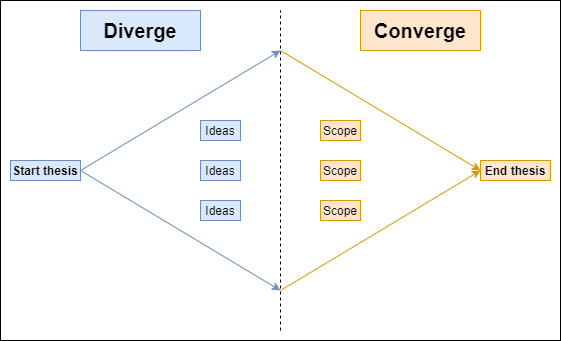Introduction to new series
Hi! You most likely clicked on this article because you are studying Information Management at Tilburg University and you will soon start writing your thesis. It may also be that you have already started and you need tips for writing your thesis. This is the first article of a ten-part series “How to write your thesis”. Anyway, this series of articles is mainly aimed at Information Management students. However, there will be something useful for every scriptor of every study.
At the time of writing this article, I have just completed my thesis for the master’s degree in Information Management at Tilburg University. I received a 7 for my thesis on the use of big data in decision-making within commercial companies based in the Netherlands. Interested? Read the article about my thesis. Of course, I had obstacles that I had to deal with during my thesis. I would like to share my obstacles and solutions through this article series. I would also like to explain the course of my thesis process.
The series will look like this:
- Part 1: Introduction and finding a topic (this article)
- Part 2: Internship or not?
- Part 3: Writing a research proposal
- Part 4: How to review literature?
- Part 5: Finding a suitable research methodology
- Part 6: Collecting data
- Part 7: Analyzing your data
- Part 8: Making a conclusion
- Part 9: Writing an 80% version
- Part 10: Preparing for your defense
Each article will provide a brief explanation of the relevant topic. In addition, I will provide concrete examples in each article so that you can apply this to your own thesis.
Now that I’ve introduced the series, we can really get started. We will first talk about the first step of your thesis: finding a suitable topic.
Finding a suitable thesis topic
Finding a topic is actually not difficult. Find something you find very interesting and choose that. However, it is important to also think about what you want to research about the subject. This is the tricky part. Among other things, you also have to think about where you are going to get your data from and whether you can access the relevant data source.
An article on ITHappens has already discussed how you can get inspiration for finding a suitable topic for your thesis. Therefore, first read the article about ‘Finding a suitable thesis subject‘ . I will list the main points for you and if you want more depth, I recommend that you read the article carefully yourself. The following tips are given in the article:
-
- Think about which courses you like;
- Talk to teachers from courses with certain professions;
- Look at previous theses. Multiple theses have been shared on ITHappens;
- Thesis of Linsy (Best thesis award)
- Thesis of Rick
- Talk with SBIT members or Alumni;
- Attend informal activities with SBIT and talk to professionals;
- Think about writing your thesis for a company or the university.
Multiple thesis ideas are presented in the article. Maybe you can find something useful there? Find potential topics here.
There are of course more ways to find a nice topic for your thesis. These are discussed in this article.
More tips
Multiple tips are given in the following section. These will help you start your thesis writing process.
1) A thesis is an ‘opportunity’, not a ‘must’
Many students view their thesis as a requirement to obtain their degree. However, you can also see it as an opportunity to release your energy and creativity on something you find very interesting. You are going to investigate something that no one has ever investigated before. It therefore helps to change your mindset to something you can just do instead of something you have to do.
During your thesis period, you get the chance to become expert in a problem/topic that you find interesting. Nobody will have a level of expertise in the topic as you have after you have written your thesis. Take that opportunity! Besides, your thesis outcomes can help other people worldwide with their problems. Your thesis topic will at least be relevant to someone.
There also lies an opportunity in getting coached by a professional or expert in the field. A Teacher from your university will guide you in writing your thesis. Take this opportunity by learning as much as you can from your teacher. His/her expertise is really valuable and you get the chance to benefit from it.
2) Finding inspiration
You can also look around for ‘hot topics’ on media such as LinkedIn, Instagram or news websites. Well-known LinkedIn groups within the IM field are:
On Instagram you can easily find hashtags or accounts by searching for certain keywords. You can use the same keywords on Google news. Google will then automatically recommend you news articles to read within the field. There is also plenty to find about the field on YouTube.
Tip: Make sure that your search starts broad and gradually narrows in scope over time.
3) Start searching for scientific articles
You don’t have to choose one topic right away. You can also choose a number of topics and decide later which ones you want to delve into. As a researcher you will build on existing research or discover something completely new. Therefore, start collecting papers on topics that you find interesting. A well-known source is Google Scholar . Also check whether the papers are of high quality, whether they have been peer reviewed, and whether the paper in question has been extensively referenced. This is also the moment where your literature study actually begins.
Another great source is EBSCO Business Source Ultimate. A lot of great articles can be found there that are not on Google Scholar.
Tip: Make sure you keep track of your sources from the start. Record them in an Excel file. Or use a reference manager.
4) Look at ‘limitations’ and ‘future research’ in papers
In almost every paper, limitations to the existing study are discussed. These limitations can be addressed by further research. This is an opportunity for aspiring scriptwriters to find a topic. In addition, almost every paper also discusses possible future research. The researcher in question then indicates which topics are also interesting to investigate, but which he/she has not yet gotten around to.
5) Teachers have thesis topics to offer
University teachers don’t just teach. They are also researchers themselves. A teacher often conducts research into the field he/she teaches. A teacher is often passionate about his/her field and wants to share this passion with students. Therefore, ask whether your teacher has ideas for a thesis topic. In addition, a teacher may also have a topic to offer. He/she will then post ‘vacancies’ on media such as Canvas or on their own website to apply for a thesis topic. So also check whether your teacher has a website.
Here are some websites of IM teachers:
A vacancy for a master thesis offered on Canvas.
6) Be active and creative with your field of expertise
Inspiration for a subject also comes when you are actively and creatively involved in the field. The tips given in this article are not exhaustive. I therefore recommend unleashing your creativity. The topic you want to research must be something you really enjoy.
Tip : Make sure you choose a topic that you really enjoy researching. There’s no point in choosing a subject you don’t like at all.
My own experience
I personally chose the topic of big data as a topic. This topic had been on my radar for a long time and I wanted to delve deeper into it. In addition, during the premaster of Information Management I had written a paper about decision support systems. Decision making and IT have always interested me ever since. That is why I combined Big Data and Decision Making in my search for a research topic. I found a recently published, peer-reviewed paper from a well-known high-quality journal in which a gap was specifically described. That is why I have addressed this gap and further substantiated it with other papers that (partially) describe the same gap. The described gap indicated to me that more exploratory research was needed on this topic. This also helped predetermine my research methodology. I ultimately chose multiple-case study as a research methodology.
It helped me a lot that I found my thesis topic very interesting. Writing a thesis has ups and downs. The fact that I found it an interesting subject got me through the downs.
In the next part of this series…
This was the first part of the ‘How to write your thesis’ series. This is followed by an article about whether you should write your thesis at a company or organization. The pros and cons are weighed here.






